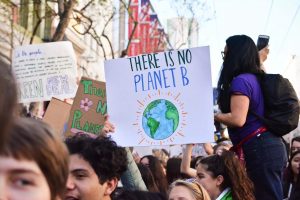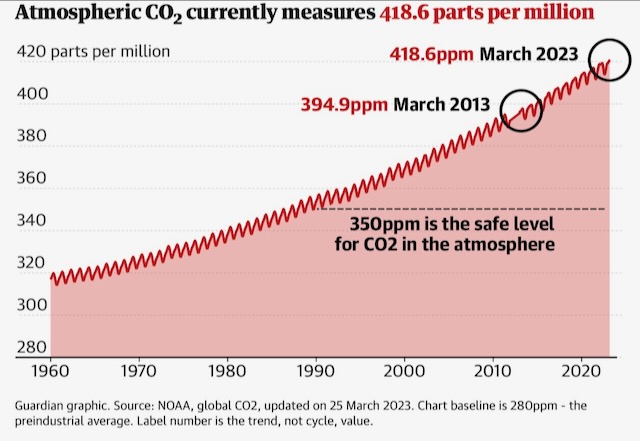Did You Hear About the Latest Climate Report? Likely Not
Mar 27th, 2023 | By admin | Category: Climate ChangeBy Suzanne York, Transition Earth.
The recent Intergovernmental Panel on Climate Change (IPCC) summary report (‘Summary for Policymakers of the Synthesis Report’) dropped with little notice by major media outlets. That’s no surprise, given their track record on the issue, but it should clearly be a wake-up call for everyone.
This report lays out what is at stake, integrating details from six past assessments that all state that all roads lead to this theme: adverse impacts from human-caused climate change will continue to intensify. Many of us can only imagine the frustrations scientists feel in trying to get this message across.
Hitting Us Over the Head with Climate Warnings
But fortunately, the scientists keep trying. The main point from the new IPCC report states, “Human activities, principally through emissions of greenhouse gases, have unequivocally caused global warming, with global surface temperature reaching 1.1°C above 1850–1900 in 2011–2020. Global greenhouse gas emissions have continued to increase, with unequal historical and ongoing contributions arising from unsustainable energy use, land use and land-use change, lifestyles and patterns of consumption and production across regions, between and within countries, and among individuals.” In other words, little has changed since the first IPCC report came out way back in 1990.
Climate disruption impacts vulnerable people the most, and we know of course that wealthy nations bear the majority of responsibility for where things currently stand. Yet the longer the world waits to take serious action, the more costly it will be for all countries. The UN secretary general, António Guterres, perhaps said it well enough to capture some peoples’ attention, merely by mentioning an Oscar winning movie:
This report is a clarion call to massively fast-track climate efforts by every country and every sector and on every timeframe. Our world needs climate action on all fronts: everything, everywhere, all at once.
The IPCC lays out a dire current situation and future driven by extreme weather. Humans are, overall, a shortsighted species, which creates a huge obstacle to action. We dominate the planet, altering and decimating precious ecosystems for our own needs, seemingly with little thought that this could blowback and hurt us.
Eight billion people have an environmental footprint, albeit at very different levels. Just 10 percent of households are responsible for 34 to 45 percent of greenhouse gas emissions. If everyone on the planet lived like an American, we would need 5.1 Earths. If everyone lived like an Indian, just .8 Earths would be needed. Yet for most of us – rich, middle class or poor – our lives and the society in which we exist are highly dependent on fossil fuels, exacerbating environmental problems and leading to more climate disruption.
Messaging
For non-scientists and the general public, maybe all they need to hear from the IPCC report is this – “There is a rapidly closing window of opportunity to secure a livable and sustainable future for all (very high confidence).” If you care about other people, children and future generations – not to mention the planet itself – this type of messaging should spur action. Imagine if the latest climate catastrophe reported on by the mainstream media always ended with this statement?
Taking that thought further, imagine if media reports also included solutions we already have, namely getting off fossil fuels and switching to clean energy, thereby reducing greenhouse gas emissions. The IPCC highlighted actions such as efficient buildings, ecosystem restoration and resilient power systems. All necessary undertakings, but the most effective solutions are our biggest challenges to implement, such as changing an economic system based on unsustainable growth, reducing overconsumption, meeting the need for family planning services, and setting aside land for nature and indigenous peoples.
One climate scientist in particular has made inroads on messaging and the media. Dr. Katharine Hayhoe compared climate warming to having a fever as an analogy for readers of the New York Times:
Think about how much worse you feel when you run a fever of 101.3 degrees Fahrenheit, 2.7 degrees above normal. That fever is the equivalent of what the planet is facing.
It’s Now or Never
Today’s average global temperature is 1.1 degrees Celsius higher than it was at the beginning of the industrial age. It’s risen faster since 1970 than in any other 50-year period in the last 2,000 years. So have the rates of biodiversity loss, population growth, consumption, and shockingly, despite so much wealth, levels of inequity and inequality continue to remain high.
The window of opportunity for addressing severe climate disruption is rapidly closing, or perhaps it has already closed. Nevertheless, the world must do all it can to limit planetary warming for the sake of a livable planet for all species. We can’t keep kicking the can down the road, or worse, operating from the perspective that ignorance is bliss. If we don’t alter our behavior, the world will be a very different place, sooner than most realize.
Suzanne York is Director of Transition Earth.



![[photo: Unsplash, Tobias Rademacher]](http://populationgrowth.org/wp-content/uploads/2023/03/tobias-rademacher-CeF_z3pEzLg-unsplash-683x1024.jpg)